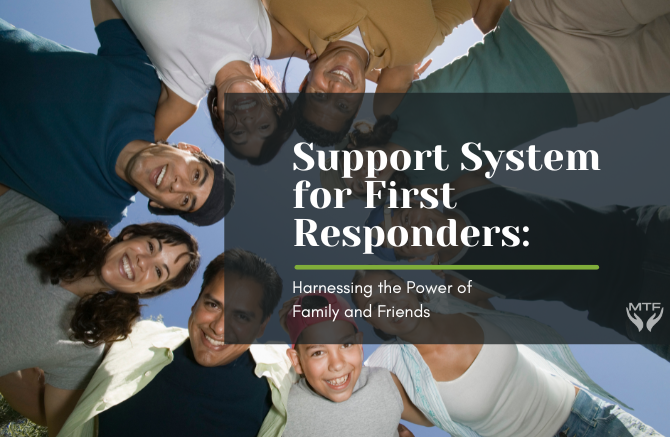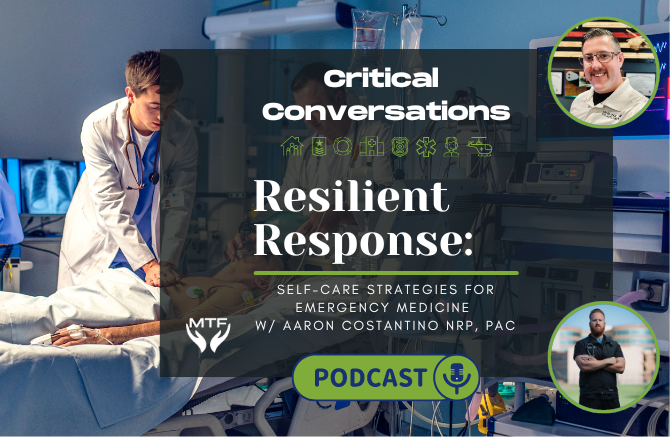Support System for First Responders: Harnessing the Power of Family and Friends
Discover the importance of a strong support system for first responders and how they can find solace in the love and understanding of their family...
6 min read
 Chris Smetana, AS, FP-C, CCP-C, NRP | Founder/President
:
Feb 14, 2024
Chris Smetana, AS, FP-C, CCP-C, NRP | Founder/President
:
Feb 14, 2024
-3.png)
Discover the essential trauma care resources and support for the spouses of first responders in this comprehensive blog post.
Being the spouse of a first responder is a role that comes with unique challenges and responsibilities. These individuals not only have to navigate the usual ups and downs of a relationship, but they also have to contend with the constant exposure to traumatic events that their partners face on a regular basis. This constant exposure to trauma can have a profound impact on their mental and emotional well-being.
First responder spouses often find themselves constantly worrying about the safety of their loved ones. Every time their partner goes out on a call, there is a lingering fear that they may not come back. This constant state of worry can lead to high levels of stress and anxiety, as they are always on edge, waiting for that phone call or knock on the door that could bring devastating news.
In addition to the emotional toll, the unpredictable nature of their partner's job can also disrupt family routines and put strain on the relationship. First responders work long and irregular hours, often missing important family events and milestones. This can lead to feelings of resentment and frustration, as the spouse is left to manage the household and family responsibilities alone.
Another challenge that first responder spouses face is social isolation. The demanding schedules and unpredictable work hours of their partners can make it difficult to maintain a social life or participate in community activities. They may find themselves constantly canceling plans or missing out on social events because their partner is called away at the last minute. This isolation can further exacerbate feelings of stress and loneliness.
It is crucial for us to recognize and understand these challenges faced by first responder spouses. By acknowledging the unique struggles they face, we can better support them in their journey towards healing and resilience. Providing resources and support tailored specifically for these individuals can make a significant difference in their well-being.
From peer support groups and online communities to counseling and therapy options, there are a variety of resources available to help first responder spouses navigate the challenges they face. Connecting with others who are going through similar experiences can provide a sense of community and understanding. It allows individuals to share their challenges, exchange coping strategies, and find solace in knowing that they are not alone.
Accessing professional help, such as counseling and therapy, is also essential for first responder spouses who are experiencing trauma. These services can provide a safe and confidential space for individuals to process their emotions, develop coping strategies, and work towards healing. It is important for them to know that seeking professional help is not a sign of weakness, but rather a proactive step towards their own well-being.
In addition to seeking external support, practicing self-care is crucial for the well-being of first responder spouses. Prioritizing self-care by engaging in activities that bring joy and relaxation, seeking support from friends and family, establishing routines, practicing stress management techniques, and maintaining healthy boundaries can all contribute to their overall well-being.
By understanding and addressing the challenges faced by first responder spouses, we can create a supportive environment that promotes healing and resilience. It is important to provide them with the resources and support they need to navigate the unique challenges they face. Together, we can ensure that they receive the care and understanding they deserve as they support their partners in their vital roles as first responders.
-3.png?width=300&height=196&name=MTFL%20%20Blog%20Hero%20Image%20(15)-3.png)
Trauma experienced by first responders not only affects them directly but also has a profound impact on their spouses and families.
This refers to the emotional and psychological distress that individuals indirectly exposed to trauma may experience.
The effects of secondary trauma can be significant for spouses. They may find themselves struggling with their own trauma symptoms, such as intrusive thoughts, nightmares, and hypervigilance. The constant worry and fear for their partner's safety can take a toll on their mental and emotional well-being. Additionally, spouses may also feel a sense of helplessness and guilt for not being able to protect their partners from harm. They may question whether there was something they could have done differently or blame themselves for not being able to prevent the traumatic events.
Children in first responder families are not immune to the impact of trauma either. They may witness the stress and worry experienced by their parents, and this can lead to changes in their behavior, difficulties in school, and increased anxiety. They may struggle to understand and process the emotions and events that their family is going through, which can further exacerbate their own emotional well-being.
Recognizing the impact of trauma on spouses and families is crucial for providing appropriate support and intervention. By acknowledging and addressing the secondary trauma experienced by spouses, we can help them navigate their own emotions and find ways to cope with the challenges they face. It is important to create a safe and supportive environment where spouses feel comfortable seeking help and expressing their feelings.
Providing resources and support tailored specifically for spouses and families can make a significant difference in their well-being. This can include access to counseling and therapy services, peer support groups, and educational resources on trauma and its effects. By equipping spouses and families with the tools and knowledge to navigate the impact of trauma, we can empower them to support their loved ones while also taking care of themselves.
The impact of trauma on first responder spouses and families should not be overlooked. The emotional and psychological distress experienced by spouses, as well as the effects on children, require appropriate support and intervention.
By recognizing and addressing these challenges, we can create a supportive environment that promotes healing and resilience for the entire family unit.
-3.png?width=300&height=196&name=MTFL%20%20Blog%20Hero%20Image%20(14)-3.png)
One of the most valuable resources for first responder spouses is the support of others who are going through similar experiences. Connecting with other spouses can provide a sense of community and understanding. It allows individuals to share their challenges, exchange coping strategies, and find solace in knowing that they are not alone.
There are various ways to build a supportive network. Spouses can join online support groups or attend local support meetings specifically designed for first responder families. These platforms offer a safe space to share experiences, seek advice, and offer support to one another. Additionally, some organizations provide formal peer support programs that match spouses with mentors who have similar experiences.
By building a supportive network, first-responder spouses can find comfort, validation, and strength in their shared journey.
-3.png?width=300&height=196&name=MTFL%20%20Blog%20Hero%20Image%20(16)-3.png)
In addition to peer support, accessing professional help is essential for first responder spouses who are experiencing trauma. Counseling and therapy can provide a safe and confidential space for individuals to process their emotions, develop coping strategies, and work towards healing.
There are various counseling and therapy options available to first responder spouses. Individual therapy allows individuals to work one-on-one with a therapist to address their specific needs and concerns. Couples therapy can help improve communication and strengthen the relationship between spouses. Family therapy involves the entire family in the healing process and can be beneficial in addressing the impact of trauma on children.
-2.png?width=300&height=196&name=MTFL%20%20Blog%20Hero%20Image%20(17)-2.png)
Taking care of oneself is crucial for the well-being of first responder spouses. Here are some self-care tips that can help individuals navigate the challenges of supporting a first responder:
- Prioritize self-care: Make time for activities that bring joy and relaxation, whether it's reading a book, taking a walk, or practicing mindfulness.
- Seek support: Reach out to friends, family, or support groups when in need of emotional support or a listening ear.
- Establish routines: Creating predictable routines can provide a sense of stability and control amidst the unpredictable nature of a first responder's job.
- Practice stress management techniques: Engage in stress-reducing activities such as exercise, deep breathing, or meditation.
- Maintain healthy boundaries: Set boundaries to protect personal time and avoid becoming overwhelmed by the demands of supporting a first responder.
By practicing self-care, first responder spouses can enhance their own well-being and better support their partners and families.
-3.png?width=300&height=196&name=MTFL%20%20Blog%20Hero%20Image%20(18)-3.png)
Explore many valuable First Responder Mental Health and Wellness resources on Mind the Frontline's online platform. Discover the link below to access a wide range of support and information tailored specifically for first responders.
Additional Mind the Frontline Resource's
Stay connected with Mind the Frontline on Facebook & LinkedIn.
Invest in your mental health with the Mind Shield Health and Wellness Membership—a transformative resource tailored for first responders. For less than $2 per month, this 100% tax-deductible membership offers a suite of exclusive benefits designed to enhance your overall well-being.
Membership Highlights:
The Largest Online First Responder Mental Health and Wellness Resource Directory: Immediate access to a comprehensive database catering to the unique needs of first responders.
State-by-State Mental Health, Wellness, and Recovery Resources: Navigate a localized guide for personalized support.
MindShield 24/7 Debrief Hotline: Confidential and secure debriefing space, available whenever you need it.
Virtual 1-1 Peer Support: Connect with a supportive network of peers through our virtual platform.
Mind the Frontline's Preferred Mental Health Providers List: Access trusted mental health professionals aligned with our mission.
Discounts to Mental Health Apps: Exclusive discounts on leading mental health apps like Headspace and more.
Recommended Books, Podcasts, and Resources: Curated selection to enhance your mental health journey.
Weekly Blog Articles/Podcasts: Stay informed and inspired with regular content delving into crucial insights and topics.
Interactive Workshops and Webinars: Engage in dynamic sessions promoting mental health, career development, and overall well-being.
Mindfulness and Meditation Resources: Tools for incorporating mindfulness into your daily routine.

Discover the importance of a strong support system for first responders and how they can find solace in the love and understanding of their family...

Discover effective self-care strategies and team dynamics in emergency medicine to enhance well-being and resilience among first responders.
-2.png)
Discover effective strategies for first responders to recover from traumatic events and build resilience.